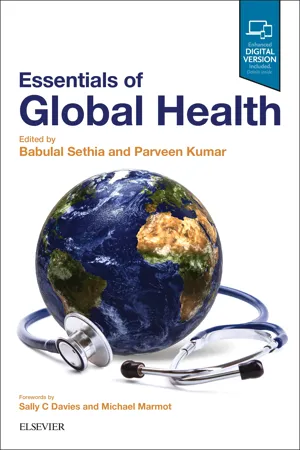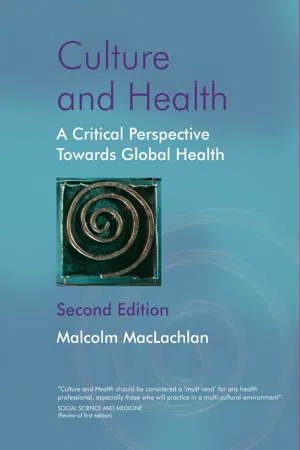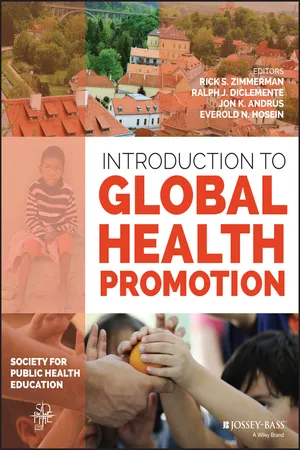Social Sciences
Global Health Industry
The global health industry encompasses the organizations, businesses, and institutions involved in promoting and delivering healthcare services and products on a worldwide scale. It includes pharmaceutical companies, healthcare providers, public health organizations, and non-governmental organizations working to address health challenges across borders. The industry plays a critical role in shaping health policies, advancing medical research, and improving access to healthcare globally.
Written by Perlego with AI-assistance
Related key terms
1 of 5
7 Key excerpts on "Global Health Industry"
- eBook - ePub
- Babulal Sethia, Parveen Kumar, Babulal Sethia, Parveen Kumar(Authors)
- 2018(Publication Date)
- Elsevier(Publisher)
Chapter 1.3 .Global health
Some commonly used definitions of global health include:- ▪ ‘Health issues where the determinants circumvent, undermine or are oblivious to the territorial boundaries of states, and are thus beyond the capacity of individual countries to address through domestic institutions. Global health is focused on people across the whole planet rather than the concerns of particular nations. Global health recognises that health is determined by problems, issues and concerns that transcend national boundaries’ (HM Government, 2008).
- ▪ ‘An area for study, research, and practice that places a priority on improving health and achieving health equity for all people worldwide’ (Koplan et al., 2009 ).
- ▪ ‘Health problems, issues, and concerns that transcend national boundaries, may be influenced by circumstances or experiences in other countries, and are best addressed by cooperative actions and solutions’ (US Institute of Medicine, 1997).
Global health is an interdisciplinary field which encompasses disciplines such as law, economics, history, social and behavioural sciences, engineering, biomedical and environmental sciences and public policy.Global health is relevant because many health care professionals train and practice both in their country of origin and in foreign lands.Why is global health relevant?
International clinical placements
The globalised world
Each year, around 3 billion airline passengers fly within and across borders. Infectious disease epidemics/pandemics and mass migration are all major issues requiring a globalised approach to health policy and leadership. The Internet and the increasing connectivity of individuals across the globe in the 21st century provides a reminder of the importance of being a ‘global citizen’, and improving the health of everyone in the global, interconnected village. - eBook - ePub
International Development
A Global Perspective on Theory and Practice
- Paul Battersby, Ravi Roy, Paul Battersby, Ravi Roy, Author(Authors)
- 2017(Publication Date)
- SAGE Publications Ltd(Publisher)
17 Global Health and Development PracticeDebbi LongPaul KomesaroffElizabeth KathIntroduction
The term ‘Global Health’ encompasses a range of concepts and activities, including concerns and practices relating to health that cross national borders and are implemented in multiple settings across the world (Brown et al., 2006; Koplan et al., 2009). The Executive Board of the Consortium of Universities for Global Health has argued for a ‘unified definition’, as follows:Global Health is an area for study, research, and practice that places a priority on improving health and achieving equity in health for all people worldwide. Global Health emphasizes transnational health issues, determinants and solutions; involves many disciplines within and beyond the health sciences and promotes interdisciplinary collaboration; and is a synthesis of population-based prevention with individual-level clinical care. (Koplan et al., 2009: 1995)This definition entails a radical reformulation of previous ways of understanding the nature of health issues across international borders, especially in its call for multidisciplinary input into health solutions. The approach overcomes many of the criticisms to which the erstwhile concept of ‘international health’ was subjected, and it has been linked to progressive social and political movements and causes.While recognizing the value of the shift from ‘International Health’ to ‘Global Health’, it is crucial also to explore the limitations and pitfalls associated with it. This chapter provides a critical overview of Global Health as an academic discipline and practice and the key developments that have taken place within Global Health discourse over the decades since the term emerged. It discusses both the strengths and limitations of current Global Health approaches and goes on to critically examine developments over recent decades, such as the concept of the ‘social determinants of health’. Finally, the chapter proposes that a way forward in response to these limitations is to mobilize the achievements of Global Health discourses in the service of novel and fecund practices based simultaneously on a global commitment to social and political change, respect for local cultures and knowledge, and respect for those who work within them. - eBook - PDF
Health for Some
The Political Economy of Global Health Governance
- S. MacLean, S. Brown, P. Fourie, S. MacLean, S. Brown, P. Fourie(Authors)
- 2015(Publication Date)
- Palgrave Macmillan(Publisher)
Part I Introduction 3 1 Introduction: The Social Determinants of Global Health: Confronting Inequities Sandra J. MacLean and Sherri A. Brown Health, at a population level, is largely socially determined; consequently, rich countries and communities tend to have significantly better health out- comes than poor ones. In the current era, this observation is critical, given that globalization has been implicated in producing economic convergence within and between some countries, but appreciably greater socioeconomic gaps in others (Farmer, 2003; OECD, 2008). To grasp the nature of health and disease in the world today, therefore, entails understanding not only biological phenomena, but also who wins and who loses as a result of the recent changes in global political economy. Moreover, to be effective, global health governance must address the underlying structures of political econ- omy that are primary sources of social inequalities and inequities and thus contributors to negative health outcomes (CSDH, 2008). Over the past two to three decades, several health problems with world- wide implications have emerged to spawn an explosion of interest in ‘global health’. The burgeoning literature on the subject has produced important and informative research on a set of issues. However, there are problems with the current situation in global health analysis. First, there are concep- tual problems. The notion of global health is not often clearly defined; it is frequently used, for instance, in ways that do not distinguish it from the long-established concept of international health. Second, the weights given to the range of issues addressed are skewed; in particular, much of the atten- tion is focused on infectious disease to the detriment of research on chronic disease as a global health issue. - eBook - PDF
Culture and Health
A Critical Perspective Towards Global Health
- Malcolm MacLachlan(Author)
- 2006(Publication Date)
- Wiley(Publisher)
CHAPTER 9 Global health According to Nussbam we must develop: an ability to see [ourselves] . . . not simply as citizens of some local region or group but also, and above all, as human beings bound to all other human beings by ties of recognition and concern because the world around us is inescapably international. Issues from business to agricul-ture, from human rights to the relief of famine, call our imaginations to venture beyond narrow group loyalties and to consider the reality of distant lives. Nussbam (1997, p. 10) Global health is about ‘the reality of distant lives’. This reality is hauntingly brought home to us by Mallaby (2002, p. A.29) when he writes: A century from now, when historians write about our era, one question will dwarf all others, and it won’t be about finance or politics or even ter-rorism. The question will be, simply, how could our rich and civilised society allow a known and beatable enemy to kill millions of people? That killer is of course HIV/AIDS and it is perhaps one of the most distress-ing exemplars of the global reach of human suffering and illness. In Chapter 1 we noted that McAuliffe (2003) defines global health as an attempt to address health problems that transcend national boundaries, may be influenced by circumstances and experiences in other countries, and are best addressed by cooperative actions and solutions. Within this perspective the world’s health problems are seen as shared problems and are therefore best tackled by shared solutions. An implicit aspiration is to work towards removing inequalities and privileges in accessing health, i.e. to establish health as a human right. Global health disparities The Global Forum for Health Research (GFHR) is dedicated to helping correct what they refer to as the ‘10/90’ gap (2004, p. 1), i.e. of the US$ 73 billion - eBook - PDF
- Graham Scambler(Author)
- 2018(Publication Date)
- Bloomsbury Academic(Publisher)
It is a broad field, addressing such issues as global ine-qualities in health; global threats to health, including climate change; health issues that span national borders; and the challenges for international health governance. One simplified model of the pathways linking globalization and health is from Woodward and colleagues ( 2001 ), shown in Figure 3.1 . In this 44 Sociology as Applied to Health and Medicine model, the drivers of globalization have direct influences on health through international trade agreements (which dictate, for instance, pharmaceutical prices or the economic viability of growing particular crops) and through cross-border exchanges such as those of infectious disease, or tobacco. There are also indirect influences which operate through national-level policies, with the effects of trade liberalization felt in terms of national expenditure on health systems and workforces, and on the determinants of health, such as availability of work or affordable food (see Chapter 2 ). Although the arrows in this model illustrate the ways in which globalization impacts on health, it is important to note that there are flows back up the system: if the health of the working population is diminished by HIV infection, for instance, this will Driving forces, facilitating factors and constraints World markets National economy, politics, and society Health-related sectors Population level health influences Individual health risks Household economy Health Health care system Globalization Figure 3.1 Global health pathways Source : Woodward et al. ( 2001 ) 3 Globalization and Health 45 damage household economies, and reduce trade, as well as erode the pool of potential people who can train as health care workers. - eBook - ePub
- Peter Dwyer, Sandra Shaw, Peter Dwyer, Sandra Shaw, SAGE Publications Ltd(Authors)
- 2013(Publication Date)
- SAGE Publications Ltd(Publisher)
13 Global Social Policy: Globalized Health Policy Sandra ShawOverview
- Globalization is a process that has been occurring over a long period of time, but which has intensified in the 20th century, and is associated with the development of a global capitalist economy.
- Globalization is seen as having positive and negative consequences, with a potential for creating and deepening inequalities.
- Global social policy opens up new opportunities for developing social policies that transcend national boundaries and new areas of study for social policy students.
- Global governance refers to the way that influence on policy making can be diverse, including a range of ‘actors’ such as non-governmental organizations (NGOs), international governmental organizations (IGOs), governments, multinational corporations (MNCs), voluntary sector organizations and pressure groups.
- Health policy provides a good example of the complexity of global social policy that highlights a range of global issues and the evolving responses to them.
Introduction
Studying social policy today entails looking outside of the national state, and developing an awareness of what is happening in this broader global context, and how this impacts on social policy. Yeates argues that global social policy:has broadened and invigorated the study of social policy itself and has undergone substantial developments itself, bringing in a new range of concerns and a new set of theoretical, conceptual and methodological approaches to understanding social policy and welfare provision. (2008a: 14–15)This chapter starts by providing a brief discussion of globalization, before moving on to consider global governance – the way that social policies are influenced at the global level. The chapter focuses on health policy as it provides an interesting illustration of how a range of different actors can exert influence on health policy at the global level, and the role of some of these organizations, including the World Health Organization (WHO), is outlined. A key aspect of global health policy has been prevention of the spread of infectious diseases. However, the chapter also recognizes that the global health agenda is complex, continuously evolving and extends across all areas of life which impact on the health and well-being of individuals, nations, regions and the world. - eBook - ePub
- Rick S. Zimmerman, Ralph J. DiClemente, Jon K. Andrus, Everold N. Hosein, Rick S. Zimmerman, Ralph J. DiClemente, Jon K. Andrus, Everold N. Hosein(Authors)
- 2016(Publication Date)
- Jossey-Bass(Publisher)
In the rest of this chapter, we consider strategies required for action on social determinants linked to health promotion around each of these five themes and present experiences of implementation in low- and middle-income countries. We then reflect on how the global health promotion community can best contribute to supporting successful implementation of the required strategies to address social determinants at local, national, and global levels to reduce health inequities.Box 3.1: The Social Determinants of Health
The social determinants of health are the social, political, economic, and environmental conditions and cultural forces in which people are born, grow, live, work, and age (Commission on Social Determinants of Health, 2008). These circumstances, which include the health system, are shaped by the distribution of money, power, and resources at global, national, and local levels, which are themselves influenced by policy choices. The social determinants of health are mostly responsible for health inequities—unfair and avoidable or remediable differences in health between populations within countries and between countries (Whitehead, 1992).Over the past 25 years, there have been significant advances in understanding the social determinants of health (henceforth “social determinants”) and their crucial role in generating health inequities. At the conceptual level, this work has been led by social epidemiologists such as Goran Dahlgren, Margaret Whitehead, and Michael Marmot (Dahlgren & Whitehead, 2006; M. Marmot et al., 2010; M. G. Marmot et al., 1991; Marmot & Wilkinson, 2005; Whitehead, 1990; Whitehead & Dahlgren, 2006), drawing attention to the wide inequities in health status within and between countries, and putting forward models of social processes to explain these inequities, rebutting the idea that they are reasonable or due to genetic, natural, or inevitable endowments.There has been growing consideration of how global organizations and stakeholders can best contribute to action within countries on social determinants to reduce inequities. In 2005, the World Health Organization, responding to the trends of widening global health inequities and increased understanding of the importance of social determinants, convened the Commission on Social Determinants of Health, chaired by Michael Marmot. The Commission's main objectives were to gather and examine the evidence on social determinants and provide support to countries in tackling the social causes of poor health and health inequities. The Commission brought together a global network of policymakers, researchers, and civil society leaders with a three-year mandate (2005–2008) to identify what was needed to reduce health inequities within and between countries and to report its recommendations for action to the director-general of WHO. The Commission's final report, “Closing the Gap in a Generation,” was released in 2008. This report presented 56 recommendations for policies across all sectors based around three overarching themes (Commission on Social Determinants of Health, 2008):
Index pages curate the most relevant extracts from our library of academic textbooks. They’ve been created using an in-house natural language model (NLM), each adding context and meaning to key research topics.






